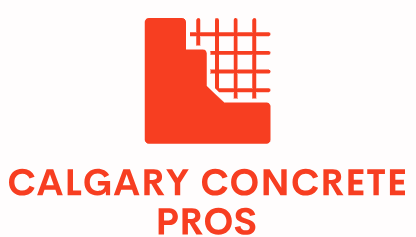Calgary Concrete Pros
Commercial Concrete Calgary
Commercial concrete, is a composite substance composed of three primary components: cement, aggregates like sand and gravel, and water. These elements are carefully mixed in precise proportions to create a paste-like substance that can be molded into various shapes. Once all of this mixture is complete, it hardens. This concrete will be more durable and have more strength than typical concrete so it can stand up to the wear and tear of daily use in businesses or high traffic property and, other professional settings where people are constantly coming back-and-forth with heavy equipment on a daily basis.
The Composition of Concrete
- Cement: Cement is the binding agent in concrete. It reacts with water to form a chemical bond that holds the concrete mixture together. Portland cement is the most commonly used type of cement in concrete.
- Aggregates: Aggregates, including sand, gravel, and crushed stone, make up the bulk of the concrete mixture. These provide stability and reduce shrinkage during the curing process.
- Water: Water is essential for the chemical reaction that hardens the concrete. The right amount of water is crucial to achieve the desired strength and workability.
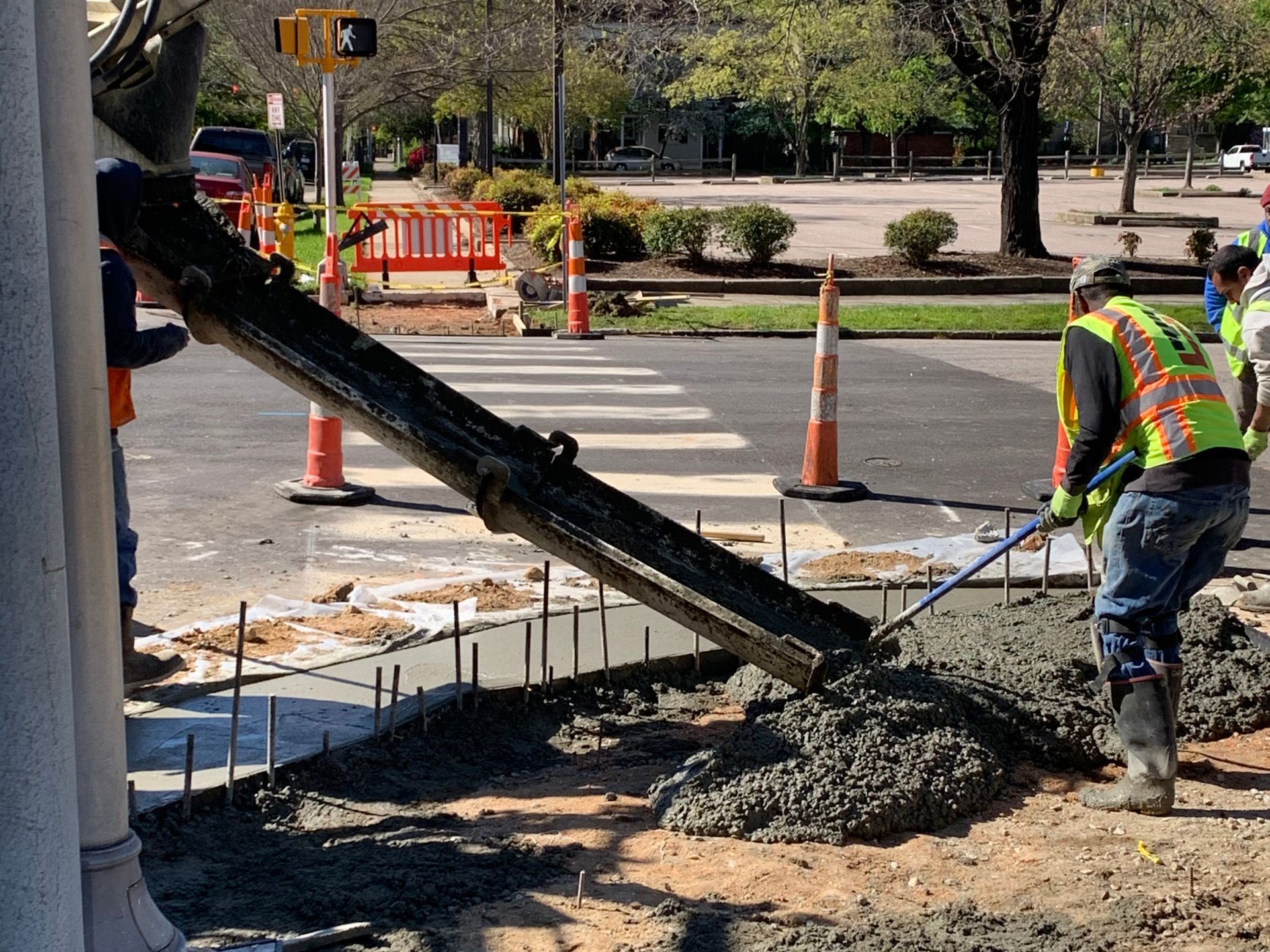
Get Instant Quote
We will get back to you as soon as possible.
Please try again later.
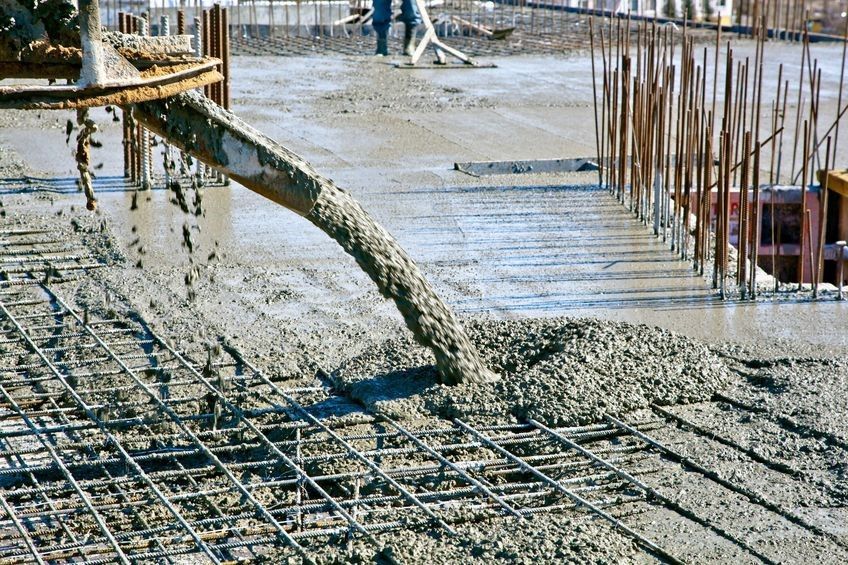
Concrete Applications
There are many different applications or situations that call for commercial grade materials. Some of the most common jobs we do include:
Paving Slabs
Paving slabs come in many colors so you can choose from one that best complements the surrounding area. They are also sturdy enough to withstand heavy vehicle traffic and can be installed in any industrial or residential setting that requires an attractive, durable material as a surface. Hiring KCP means that all of these services will be available to you at rates that won't break the bank. Our concrete work is competitively priced, and there's no job too big or small. If paving slabs is not enough for you, we also provide a variety of other concrete placing jobs:
Striping
Whether you need an occasional re-stripe on a parking lot or want to have your entire
driveway
re-striped and striped every year, our contractor can help! We offer everything from simple striping on residential driveways to large industrial tire tracks with custom patterns.
Concrete Flooring
Cement floors
offer a surface that can be used in establishments such as retail stores, restaurants and other commercial buildings, its also great for any new home construction project such as garage floors especially with acid staining.
Retaining Walls
retaining walls will provide a surface for an elevated bank or slope of earth that is often used to retain anything from water and soil to gravel and mulch this is great for gardens around your house or business.
Concrete Restoration
why does concrete crack?
Concrete, like all other materials, will slightly change in volume when it dries out thus causing cracks to appear that we can repair for you this is where
concrete restoration
comes in. Our experienced crew can resurface your existing concrete surface with new commercial grade cement that will last longer than the old stuff! We offer this service across all surfaces including parking lots, driveways, and sidewalks. Whether it be asphalt, cement blocks or even brick pavers we complete all jobs in a professional and timely manner.
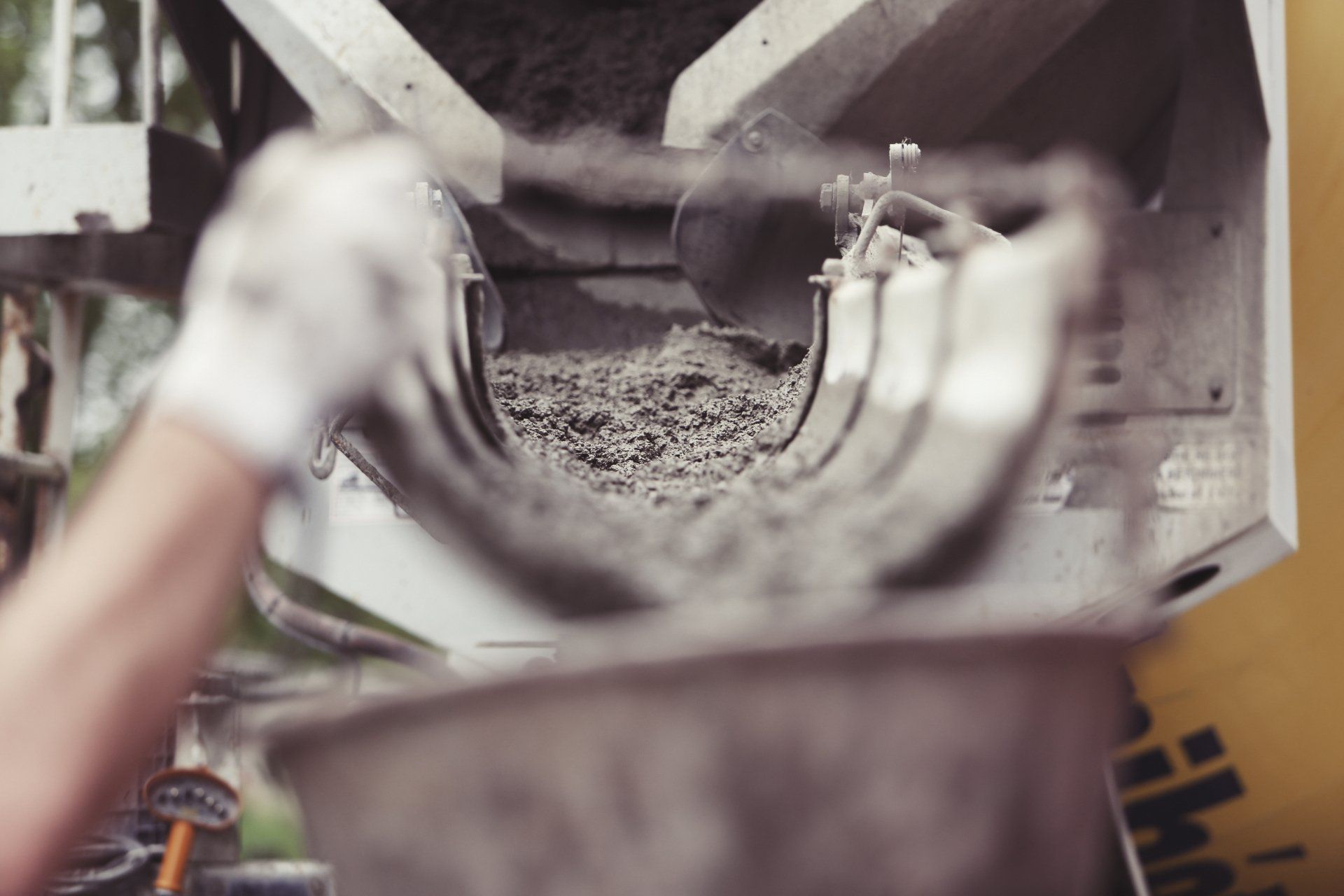
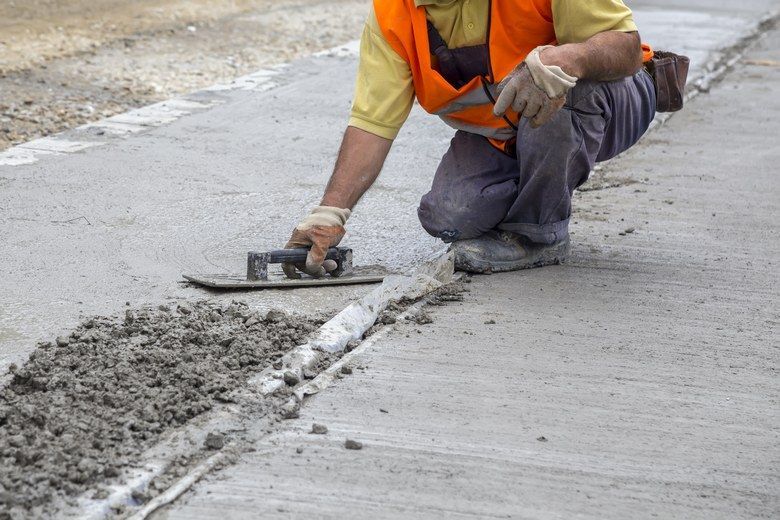
Building Foundations
Concrete foundations form the stable base on which commercial buildings stand. Once the foundation concrete hardens it provides stability and prevents settling or shifting, ensuring the structural integrity of the entire edifice of industrial spaces, office buildings, and warehouses. The advantage of concrete installation in slabs is a popular industrial technique that our team has much experience with.
Roads and Pavements
The resilience and high-performance of industrial concrete makes it the preferred choice for constructing highways, streets, sidewalks, and parking lots. It can withstand heavy traffic and harsh weather conditions.
Structural Components
Concrete is used to create beams, columns, and other structural elements that support buildings and bridges. With Tilt-Wall Structures, you can even create an entire building. Its compressive strength makes it ideal for these critical applications.
Residential Construction
In addition to commercial projects, concrete is extensively used in residential jobs, including the building of homes and apartment complexes. as well as residential walkway and driveway repairs. you can trust KCP to take care of any job you have in a timely manner.
Decorative Concrete
The professional team at Calgary Concrete Pros can install
Decorative concrete or form place finishes that can be
colored, stamped, and
polished to create aesthetically pleasing surfaces for both indoor and outdoor spaces, enhancing the overall appeal of a structure.
Air Entrained Concrete
Air entrained concrete is produced using specialist admixtures that are added to the concrete during production to deposit air pockets into the mix. The addition of billions of microscopic air cells per cubic foot into the concrete mix (providing tiny chambers) reduces the compressive strength which must be accounted for in the concrete mix design process. After the proper curing, air entrainment increases the concretes resistance to freeze thaw damage. As the tiny chambers relieve some of the internal pressure within the concrete and give water a place to go, its for areas where the concrete may become saturated and exposed to freeze thaw cycles. A secondary benefit of air entrainment is to improve the cohesion and workability of the mix this is most applicable to continuous pour concrete applications such as extruded central barriers and curb mixes and climbing continuous pour structures.
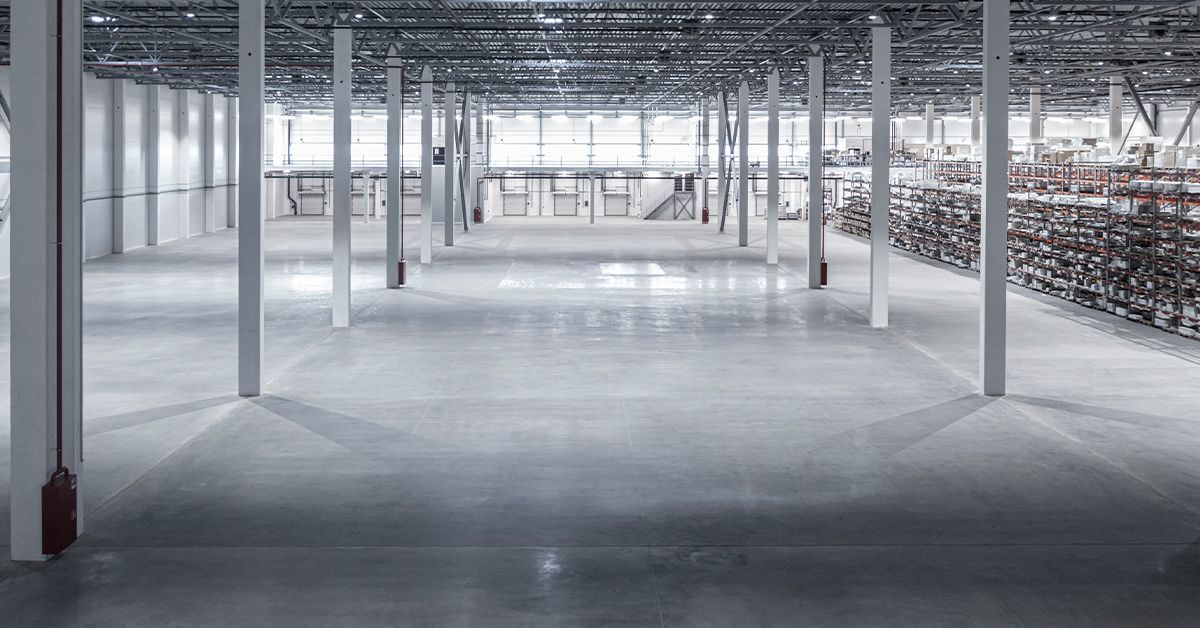
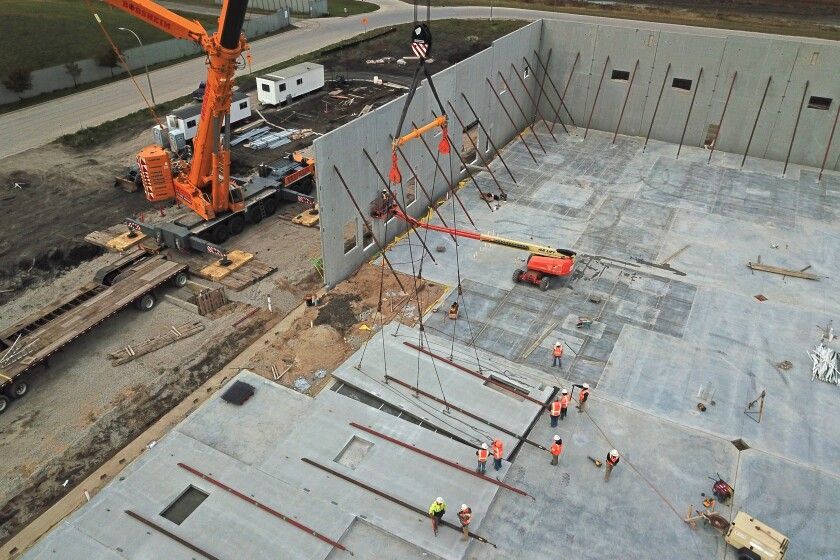
Advantages of Concrete
Durability
One of the best advantages of concrete is its durability. After all, in a large structure– or even a smaller structure– you want it to be able to stand up to things like abrasion or tension. You need the building to last and for its structural integrity to stay intact. It is able to resist many different factors that can wear down a building, such as erosion, tensile, and compressive stress. If there is a natural disaster, concrete buildings are the most likely to remain intact.
Longevity
Due to all of the factors that contribute to concrete’s strength and resilience, it will last longer and be able to stay in tip-top shape without needed repairs or renovations for longer than other building material options.
Versatility
Concrete is also one of the more versatile substances you could implement for a commercial project. It can be made to be different colors, or you could use stamps to print different patterns or motifs upon the surface before it sets. In addition to aesthetic versatility, concrete can be used in a variety of ways for a variety of different projects. For instance, it can be used to create pipes or drains that would be utilized within the building that is being constructed. It can also be used for more structural applications like walls or foundations.
Easy to Create
Another benefit of concrete is that it is easy to produce, which makes it more cost-effective and streamlines the construction process, too. Concrete is mostly made up of cement, which is made of limestone. Luckily, limestone is one of the most common minerals on earth, which means that we are not going to run out of concrete or cement anytime soon! This makes it easy to produce mass quantities of concrete in short amounts of time. In addition, concrete can be produced from waste by-products instead– these by-products would come from locations such as steel mills, power plants, or other manufacturing facilities.
Good for the Economy
Concrete is something that is good for the economy because it produces jobs, too. As mentioned above, concrete is one of the most commonly used building substances. Plus, there are such large amounts of concrete that are being produced every day, and this concrete requires workers to get it made! Due to this, many jobs have been created in the concrete industry. Since there is a constant and high demand it, it creates steady jobs that families can rely on, which is key for the local economy as a whole.
Fireproof
Certain building materials can burn, so they require extra steps in order to fireproof them. For instance, wood is not fireproof. Concrete, however, is fireproof. This not only saves time because it does not need to be fireproofed, but it also makes the building safer to begin with. Being fireproof is a crucial safety feature. It means that the building provides better protection for inhabitants in the event of a fire– it also means that the building will fare better in a fire and often will require fewer repairs afterwards. For this reason, residential buildings are often built using concrete.
Rustproof
There are some building materials out there that will rust, which is of course something that will need to be addressed later on. Rust can deteriorate materials and affect the structural integrity of a building. Luckily, concrete is rustproof! So there is one less thing to worry about once the building is complete. Often, materials that do rust will need to be replaced, so by implementing cement, builders can avoid running into this issue. For this reason, cement can be especially great for drains or pipes that will come into a lot of contact with water.
Weatherproof
In addition to being rustproof and fireproof, cement is weatherproof, too. For instance, cement is more resistant to wind, rain, or other weather than other building materials are. Cement will not rot or erode over time, (althogh it will need repairs from time to time) among other common effects that structures may see from different weather patterns. In the event of natural disasters, a cement structure is far more likely to be still standing afterwards– or will at least have suffered less damage. This is especially important in areas that see lots of storms, natural disasters, or other tough weather events.
Soundproof
Another great benefit of cement is that it is a soundproof substance. It is much more difficult for sound to travel through concrete than, say, wood, for example. Concrete can allow for more privacy in a building, and can also keep it quieter so it is more peaceful and easy to work, too. Concrete has soundproofing qualities, so just by building with it, a structure is already off to a better start than with other materials. It can then be soundproofed even further if desired. For this reason, concrete can be a great choice for apartment buildings or office buildings.
Environmentally Friendly
Last but not least, concrete is an environmentally friendly building substance option– even though it may not seem like it is at first glance! Concrete can be recycled into aggregate, which has a myriad of different uses. During the recycling process, the concrete is crushed and turned into aggregate before it can be recycled into different products. Then, it can be used for plenty of different applications! For instance, some of these uses are backfill, concrete pavement, road base, and driveways. It can be implemented for both residential and industrial use.
What Makes Our Company Unique?
One thing that sets us apart from other contractors out there is that we offer FREE estimates for any job - no matter what type of project you're looking at. We know the most important steps and offer commercial grade flooring, striping, and a whole lot more! Hiring CCP will provide your company with the best solution and all these benefits when it comes time to start pouring cement:
- Free quote for any job based on information provided by customer
- Competitive pricing includes installation services
- Quick turnaround times so projects don't get delayed and are complete
on time
Concrete is a sustainable substance that can be recycled and used again when commercial projects are completed In addition, our professional team strives to meet or exceed your expectations in terms of quality, and customer service and we are no strangers to large projects and complete all of them in a timely manner! We service Calgary and surrounding areas. Contact us today for a free quote
How do I maintain commercial concrete?
Although concrete is one of the most common paving materials used across the world, admired and sought-after for its various properties, it is also porous, which means it is susceptible to certain damages caused by natural elements, chemicals, and more. For this reason, concrete requires proper installation, routine maintenance, and sometimes, repaving, overtime. What kind of maintenance? Routine sweeping, power washing, debris removal, crack filling, and weather management are all important elements of a responsible and effective concrete maintenance plan. These routine tasks will allow paved concrete to maintain a fresh and smooth appearance.
How long does it take to calculate the volume of commercial concrete?
To calculate the volume of concrete, you can use the formula length times width times height (L x W x H)
How long do I have to wait to I walk on new commercial concrete?
You can usually walk on new concrete after 24 hours, but you should wait longer if it has rained a lot or if it's stamped concrete
How can you prevent commercial concrete cracking?
To prevent concrete cracking, we can use proper control, isolation, and construction joints
How can you protect commercial concrete from freezing?
Here are some of the methods we use to help counter the effects of freezing temperatures:
Add additional cement to the mix
Add hot water instead of cold
Heat the aggregates in the mix
Add a chemical accelerator, such as calcium chloride or a non-chloride admixture
Use a water-reducer to reduce bleed water
How is commercial concrete strength measured?
Concrete strength is measured in pounds per square inch (psi) in the U.S., or megapascals (MPa) in the metric system. The desired strength for concrete depends on the climate, with colder climates requiring higher psi
How long does commercial concrete last?
The lifespan of concrete depends on how it's used. Concrete gets stronger over time through a chemical process called hydration
Quick & Reliable
Site Map
Privicy Policy/Terms of Service
All Rights Reserved | Calgary Concrete
